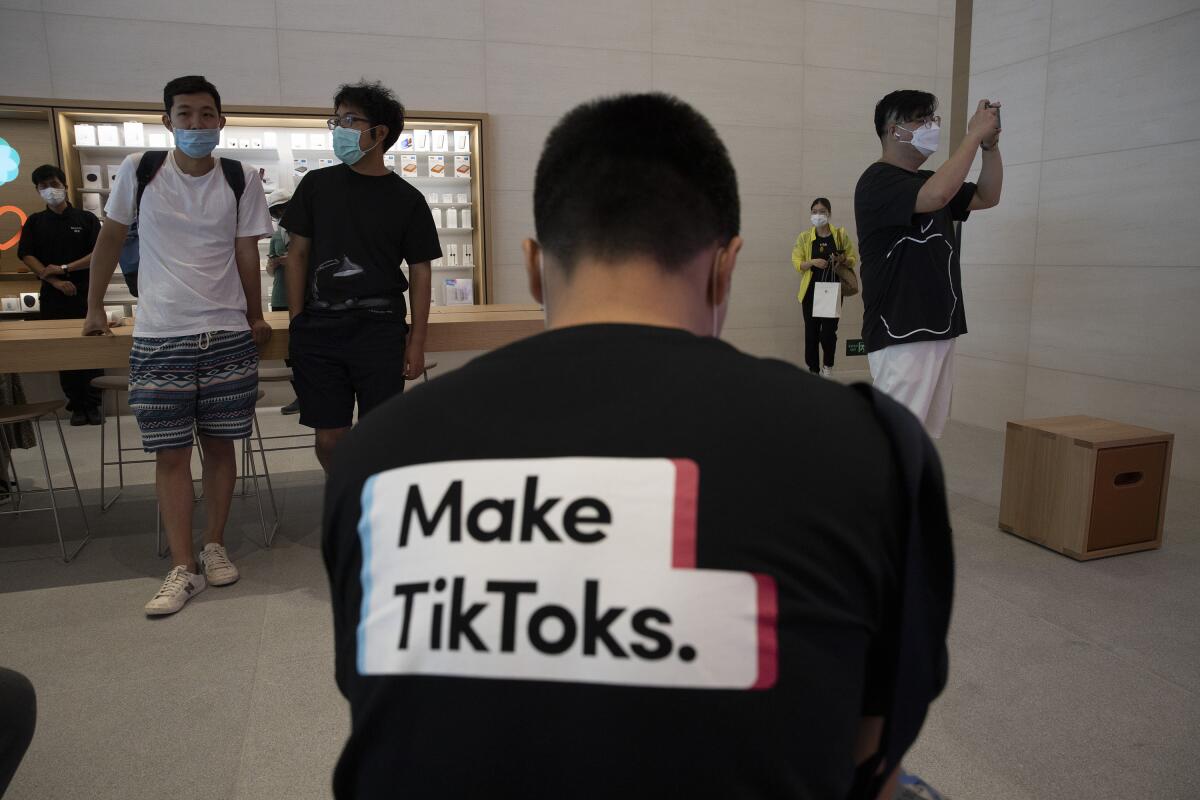U.S. to act on China software beyond TikTok, Pompeo says

The Trump administration will announce measures shortly against “a broad array” of Chinese-owned software deemed to pose national security risks, U.S. Secretary of State Michael R. Pompeo said.
The comments suggest a possible widening of U.S. measures beyond TikTok, the popular music-video app owned by ByteDance Ltd., one of China’s biggest tech companies. President Trump told reporters Friday that he plans to ban TikTok from the U.S., but no decision has been announced. Pompeo signaled that he expects a Trump announcement “shortly.” Chinese newspapers slammed a potential ban on TikTok.
The president continues to weigh his options and may have an answer Monday or Tuesday, Fox Business reported on Sunday.
Trump’s decision has implications for Microsoft Corp., which has been exploring an acquisition of the app from ByteDance, according to people familiar with the matter. Talks on the possible acquisition were left in limbo over the weekend as the parties awaited word from the White House — even as a number of Republican senators expressed support.
“If the company & data can be purchased & secured by a trusted U.S. company that would be a positive & acceptable outcome,” Sen. Marco Rubio of Florida said on Twitter. Sen. Lindsey Graham of South Carolina, a Trump confidant, tweeted that he understands the concerns of TikTok fans and users and that Microsoft taking over would be a “win-win.”
Sens. John Cornyn of Texas and Roger Wicker of Mississippi made similar comments, although Wicker also urged “tight security measures” to protect consumer data.
Chinese software companies doing business in the U.S. are feeding data directly to Chinese authorities “whether it’s TikTok or WeChat — there are countless more,” Pompeo, one of the Trump administration’s China hawks, said on Fox News Channel’s “Sunday Morning Futures.”
Trump “will take action in the coming days with respect to a broad array of national security risks that are presented by software connected to the Chinese Communist Party,” Pompeo said.
Trump can either “force a sale” of TikTok or block the app by executive order, Treasury Secretary Steven T. Mnuchin said on ABC’s “This Week,” adding that he wouldn’t discuss specifics on his talks with the president.
Mnuchin, who heads the Committee on Foreign Investment in the United States, or CFIUS, said “the entire committee agrees that TikTok cannot stay in the current format because it risks sending back information on 100 million Americans.”
The view that “there has to be a change” is shared by lawmakers that include House Speaker Nancy Pelosi (D-San Francisco) and Senate Minority Leader Charles E. Schumer (D-N.Y.), Mnuchin said.
TikTok has become one of the world’s most popular apps. It has been downloaded more than 2 billion times globally and more than 165 million times in the U.S. ByteDance is prepared to sell 100% of TikTok’s U.S. operations as a way to head off a ban by Trump, two people with knowledge of the situation said earlier.
TikTok has hired almost 1,000 people in the U.S. this year and will be employing another 10,000 into “great paying jobs” in the U.S., a spokeswoman said in a statement. The company’s $1-billion creator fund also supports people in the country who are building livelihoods from the platform, she added.
“TikTok U.S. user data is stored in the U.S., with strict controls on employee access,” she said. “TikTok’s biggest investors come from the U.S. We are committed to protecting our users’ privacy and safety.”
Chinese state media defended TikTok, characterizing the Trump administration’s antagonism toward the company in a similar fashion to U.S. politicians’ attitude toward the Chinese global networking giant Huawei Technologies Co. Ltd.
The China Daily wrote in an editorial Sunday that “although the Oval Office claims to oppose authoritarianism, it has a penchant for arbitrarily demonstrating its own authority.”
And an editorial in the Global Times, one of China’s most combative state-run papers, said that “the U.S. claim that TikTok threatens its own national security is a purely hypothetical and unwarranted charge — just like the groundless accusation that Huawei gathers intelligence for the Chinese government.”
—With assistance from Bloomberg writers Billy House and Shelly Banjo.
More to Read
Get the L.A. Times Politics newsletter
Deeply reported insights into legislation, politics and policy from Sacramento, Washington and beyond. In your inbox three times per week.
You may occasionally receive promotional content from the Los Angeles Times.










